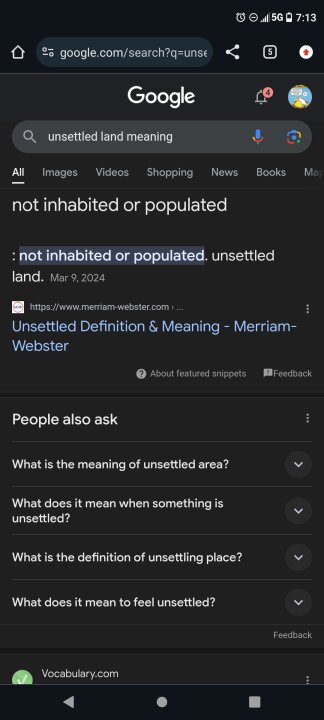@
MethDozer Sorry MethDozer, the terms "un-inhabited" and "un-settled" DO NOT mean the same thing my dear, even in the USA.
Let me take a moment to educate you on ancient world affairs.
The term "unsettled" means a place or area that is either not yet developed or built upon, or is a term used to describe a situation or issue or conflict within a region such as war, that is not yet resolved or decided. A region at war is categorized as an "un-settled" territory.
The term "uninhabited" means a place or area that is devoid of human or animal life that is not suitable for living or wildlife habitation, such as the Chernobyl region.
You can hardly argue that the terms "unsettled" and "uninhabited" mean the same thing, MethDozer! You simply didn't know the difference and as usual, you have refused to acknowledge your own lack of knowing.
Britain was indeed NOT settled before the Angles and Saxons arrived from Germany because that whole region of Britain had been in conflict involving the Romans from even before the 4th Century AD, considering the Angles and Saxons never began their westward migration to Britain until the mid-5th to 7th Century AD, which is how the English language arrived in Britain in the first place!
It was because of conflict involving the Romans from as early as the 4th Century AD that Britain became unsettled and stayed that way for at least the next 300 years!
Any previously 'settled' region that finds itself at war becomes classified as 'un-settled' because of the very nature of war itself and the unsettling dynamic that war imposes on any settlement that was previously a region at peace.
This is exactly what I stated in my quote you provided, which you quoted me as saying "The English language was then brought to the yet un-settled Island of Britain during the mid-5th to 7th Century AD by Anglo-Saxon migrants from west Germany".
It was "yet un-settled" because the Romans as well as other factions were still fighting there when the Angles and Saxons showed up between 5 and 7 AD and that whole region never did return to peace until well-after the 12 Century AD!
What you didn't know MethDozer, was that there was long-standing conflict going on in Britain for over 100 years before the Angles and Saxons ever showed up which as I said involved the Romans, which turned a benign, fun-loving and otherwise peaceful ancient settlement on the Island of Britain into an un-settled region of abject conflict because of the factions whom remained at war with each other for hundreds of years to follow.








